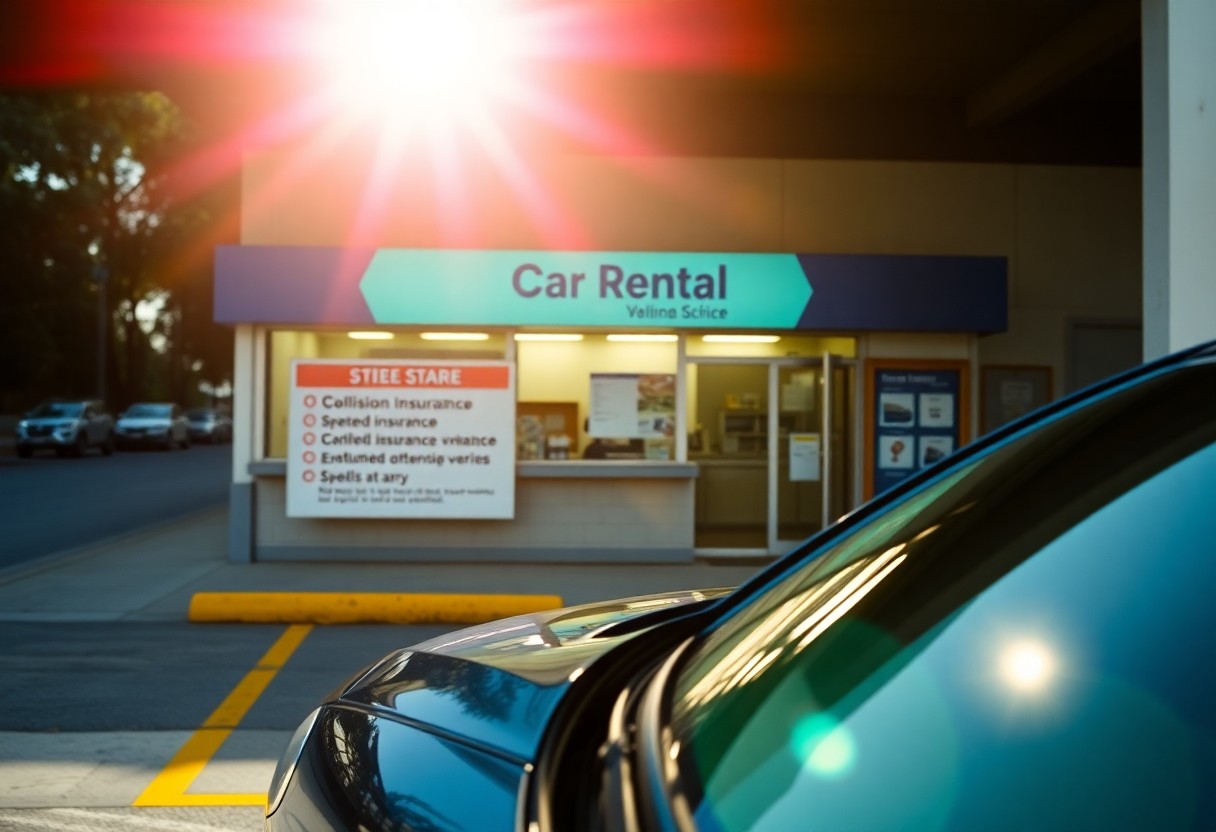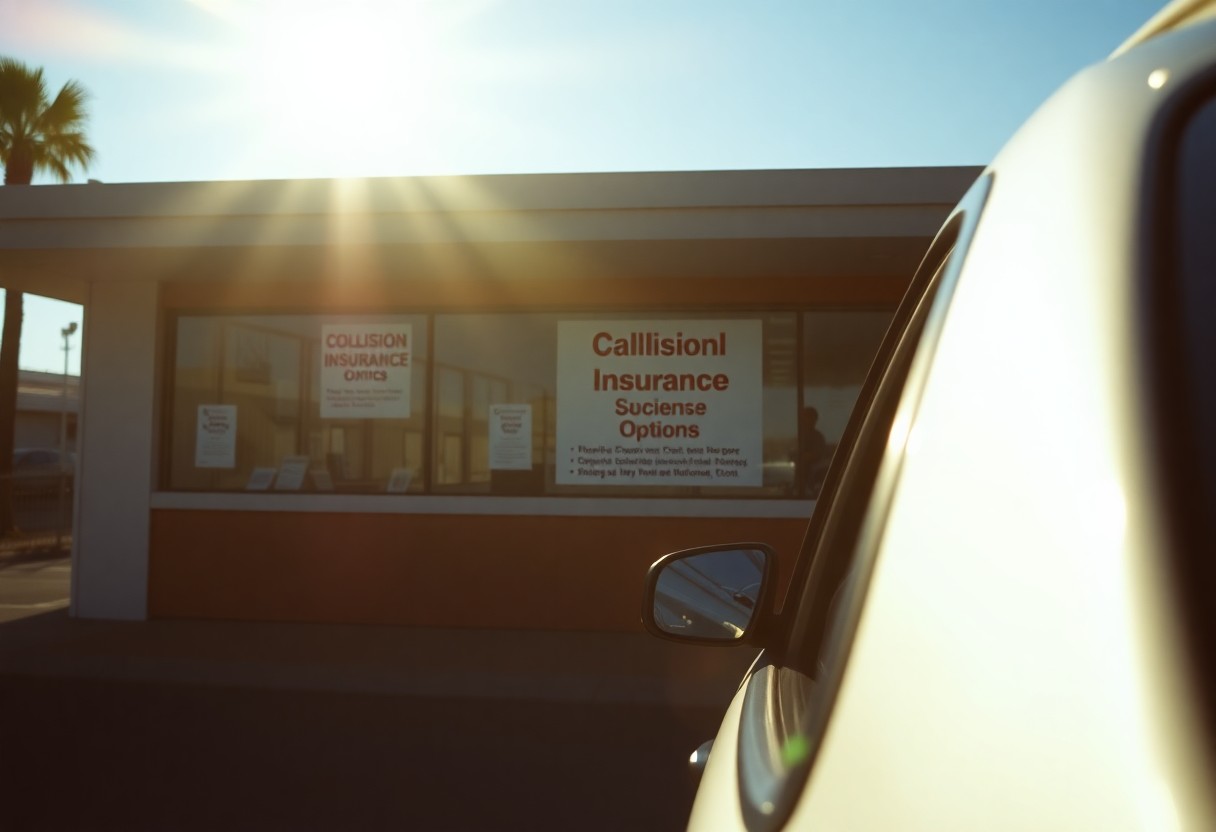Decisions regarding collision insurance at the rental car counter can often leave you feeling bewildered and uncertain about your optimal choice. Before you embark on your next car rental adventure, it’s crucial to evaluate whether your current coverage is sufficient to safeguard you against potential issues. Your personal auto insurance policy and credit card perks may already provide robust protection against rental car damage. However, if you don’t own a vehicle or your insurance coverage is limited, you could be exposing yourself to significant financial liabilities without additional protection. By thoroughly examining your current insurance policy and credit card benefits, you can make a well-informed choice that not only saves you money but also ensures that you are fully protected during your rental period.

Thoroughly Evaluate Your Existing Insurance Coverage for Rental Cars
To make a well-informed decision regarding rental car insurance, it’s essential to conduct a thorough review of your existing coverage options. A comprehensive assessment of your current insurance can potentially save you between $140 and $280 on a weekly rental by steering clear of unnecessary duplicate insurance policies. Understanding exactly what your insurance covers before you rent can not only provide peace of mind but also significantly cut down on unexpected expenses, allowing you to allocate your budget towards a more enjoyable travel experience. By taking the time to review your coverage, you can avoid the pitfalls of overpaying for insurance you don’t need while ensuring you are adequately protected.
In-Depth Review of Your Personal Auto Insurance Policy
In addition to reviewing your personal auto policy, it’s crucial to ascertain whether your current insurance includes comprehensive and collision coverage for rental vehicles. Typically, the deductible associated with your personal insurance will also apply to rentals. Therefore, it’s advisable to contact your insurance provider to confirm if your policy also extends to cover Loss of Use and Diminution of Value claims related to rental vehicles. This proactive step can save you from unforeseen costs and ensure that you are adequately protected while driving a rental car. Taking these precautions will empower you with the knowledge you need to navigate the rental process confidently.
Maximize Understanding of Your Credit Card Benefits for Rental Coverage
Credit cards can offer primary or secondary collision coverage for rental vehicles, making it vital to understand your card’s specific benefits. Most premium credit cards will provide rental car protection if you use the card to pay for the entire rental transaction. Coverage periods typically range from 15 to 31 days, depending on the card issuer. Knowing these details can help you make a more informed decision and potentially save you money on rental insurance. Additionally, being aware of any restrictions on your credit card’s coverage can help you avoid surprises during your rental experience.
Delving deeper into the specifics of credit card protection reveals that there are certain limitations you should be aware of. Your coverage might exclude specific vehicle types, such as luxury cars or oversized SUVs. Additionally, you must decline the rental company’s collision damage waiver to activate your credit card coverage. Some credit cards also have requirements that necessitate you to notify them before the rental period begins to ensure coverage is in effect. Familiarizing yourself with these conditions is essential for maximizing the benefits of your credit card.

Understanding the Financial Impact of Rental Car Insurance Choices
Your choices regarding rental car insurance can significantly affect your finances. While the daily rate for a collision damage waiver (CDW) typically falls between to per day, it’s important to recognize that your existing auto insurance or credit card benefits may already offer complementary coverage at no additional cost. Understanding these various costs and benefits equips you to make a financially sound choice that aligns with your needs. By analyzing your options, you can potentially avoid unnecessary expenses and make smarter financial decisions while traveling.
Conducting a Comparative Analysis of Rental Insurance Costs
| Rental Counter CDW | $20-30/day |
| Credit Card Coverage | $0 (included) |
| Personal Auto Insurance | $0 (included) |
By analyzing the costs associated with rental insurance options, it becomes evident that you could save up to $210 over a week-long rental by opting to utilize your existing coverage instead of purchasing additional insurance at the rental counter. This insight can help you make more economical choices while traveling. The difference in pricing highlights the importance of understanding your coverage options and making informed decisions that benefit your wallet.
Be Aware of Hidden Fees and Additional Charges When Renting
In addition to your basic rental rate, companies frequently impose unexpected charges, such as loss-of-use fees, administrative fees, and diminished value charges. These additional costs can inflate your total expenses by as much as 30-50% if you lack proper coverage. Therefore, it’s crucial to thoroughly review your current insurance policy and credit card benefits. Pay particular attention to coverage for loss-of-use fees, as many basic policies may not include these critical protections. Having a credit card that offers primary coverage can shield you from the burden of paying deductibles or risking insurance premium increases, ultimately saving you money in the long run.
Identifying and Understanding Risk Factors When Renting a Vehicle
Even the most cautious drivers face potential risks when renting vehicles, and understanding these risks is essential for making informed insurance decisions. Your exposure may include various scenarios such as:
- accidents occurring in unfamiliar locations
- theft or vandalism of the rental car
- damage due to weather-related incidents
- incidents occurring in parking lots
Recognizing these risks equips you to evaluate your need for additional insurance coverage when renting a vehicle, ensuring that you are prepared for any eventuality. By understanding the potential challenges associated with rental vehicles, you can make decisions that enhance your safety and financial security.
Special Considerations for International Travel and Rentals
When it comes to international car rentals, extra precautions are necessary. Your standard insurance and credit card benefits may not apply when driving abroad. Statistics reveal that 85% of U.S. auto policies do not extend coverage to international rentals, making it imperative to consider additional insurance for overseas travel. This proactive approach can help mitigate potential financial risks and ensure peace of mind while exploring new destinations. Being informed about the limitations of your coverage when traveling abroad can help you avoid costly surprises.
Understanding Vehicle Type Implications on Insurance Coverage
Before finalizing your choice of rental vehicle, it’s crucial to recognize that luxury cars and specialized vehicles often necessitate additional insurance coverage. Many standard policies impose limits on protection for conventional vehicles, leaving premium models and larger vehicles susceptible to coverage gaps. Furthermore, data suggests that SUVs and luxury vehicles incur a 40% higher repair cost compared to standard cars, which can pose significant financial risks if you lack adequate coverage. Basic insurance policies may cap coverage at a value of $50,000, meaning you could face considerable out-of-pocket expenses if you damage a high-value rental without the right protection. Understanding these implications is essential for making educated decisions about your rental vehicle choice.
Adjusting Insurance Needs Based on Special Circumstances and Locations
It’s important to remember that your insurance requirements can fluctuate based on specific circumstances and locations. Your standard coverage may not apply when renting in certain countries, during natural disasters, or for specialized vehicles such as luxury cars or large vans. International rentals typically require additional coverage, as standard insurance policies often do not extend beyond domestic borders. Being aware of these factors will help you avoid potential gaps in coverage that could lead to significant expenses.
Understanding Coverage Differences Between Business and Personal Rentals
To ensure that you are adequately protected, it’s essential to understand that business and personal rentals come with different insurance requirements. Your personal auto insurance may not cover business-related rentals, and your employer’s insurance might not extend to personal use. Industry data indicates that 85% of business travelers require separate coverage when their travel mixes business and personal purposes, highlighting the importance of clarity in understanding your insurance needs. This distinction can save you from unexpected liabilities during your travels.
Impact of Payment Methods on Rental Coverage and Insurance Options
When it comes to rental car insurance, business credit cards often provide different coverage levels compared to personal cards. It’s vital to confirm whether your card offers primary or secondary coverage, as this distinction can significantly impact your claims process and potential out-of-pocket expenses. Primary coverage can prevent you from needing to file claims with your personal insurance, which can save you time and hassle in the event of an incident. Understanding these differences allows you to maximize your benefits based on your payment method.
In addition to standard coverage concerns, the payment method can also influence deductibles and coverage limits. Premium credit cards frequently offer collision coverage limits up to $75,000, whereas basic cards may restrict coverage to $30,000. Be advised that using debit cards generally provides no coverage and may require additional security deposits, which can complicate the rental process. Being informed about the nuances of your payment options will enable you to choose the best one for your rental situation.

Factors Related to Time, Duration of Rental, and Insurance Needs
Your decisions regarding rental car insurance often hinge on your rental duration and travel frequency. Both your personal auto insurance and credit card coverage typically have specific time limitations regarding rental protection. It’s essential to evaluate your coverage needs differently for short weekend trips compared to longer month-long rentals to ensure you have the right level of protection. Understanding these factors can help you avoid gaps in coverage that could result in unexpected expenses during your travels.
Considerations for Short-term Rentals and Coverage Adequacy
Approximately 80% of rental car bookings are for less than five days, making it essential to understand your options for these brief rentals. Typically, your credit card’s collision coverage will provide sufficient protection for these shorter rental periods. Most credit cards offer 15-day coverage when rentals are within your home country, and 31 days for international rentals, ensuring you have the necessary protection for shorter trips. This understanding allows you to travel with confidence, knowing you are adequately covered.
Addressing Insurance Gaps for Extended Rental Periods and Associated Risks
When it comes to longer rental periods, insurance gaps become more prevalent. Standard credit card protection often expires after 15 to 31 days, which can leave you vulnerable during extended rentals. Similarly, standard auto policies frequently limit rental coverage to 30 consecutive days, making it vital to consider additional insurance if your rental surpasses this timeframe. Moreover, extended rentals come with increased risks of damage, as the longer you have the vehicle, the more exposure it faces. If your rental extends beyond the primary coverage period, securing supplemental insurance is a prudent choice. Reports indicate that accident rates escalate by 32% for rentals lasting more than three weeks, underscoring the importance of adequate protection.
Strategies for Making an Informed and Effective Insurance Decision
Ultimately, all insurance decisions should be tailored to your unique situation. Your objective is to find the right balance between adequate protection and cost-effective coverage. Research indicates that 65% of renters end up overpaying for insurance they don’t need, while a concerning 20% remain dangerously underinsured. Striking this balance is crucial for effective financial planning while traveling. Taking the time to evaluate your options can lead to significant savings and increased peace of mind.
Follow This Comprehensive Decision-Making Checklist for Insurance Selection
Making the right choice becomes straightforward when you adhere to these steps: First, check your current car insurance policy for coverage details. Next, verify your credit card benefits to understand what is included. Finally, calculate potential costs associated with your rental. If you possess comprehensive coverage on your personal vehicle and a credit card that offers primary rental coverage, you can confidently decline any additional insurance offered at the rental counter. This proactive approach ensures you are not paying for unnecessary protection.
Be Aware of Common Red Flags in Rental Agreements
Before you sign any rental agreement, it’s essential to look out for hidden fees, coverage gaps, and policy exclusions. Rental companies often employ pressure tactics at the counter, suggesting that their insurance is mandatory when it may not be. Being vigilant can prevent you from incurring unnecessary costs. At the rental counter, remain alert to common issues that could arise, such as unauthorized charges, ambiguous policy terms, and exorbitant daily rates. Data shows that rental companies may charge up to $30 per day for collision coverage that you might already have through your credit card or personal auto policy, making it imperative to remain informed and cautious.
Key Takeaways for Making Informed Decisions About Rental Car Insurance
Your decision regarding rental car collision insurance hinges on several factors, including your existing coverage and specific circumstances. If you possess personal auto insurance with comprehensive coverage or utilize a credit card that provides primary rental coverage, you can opt out of the extra insurance offered at the counter. Conversely, if you do not own a car, lack sufficient coverage, or intend to rent luxury vehicles, securing supplemental insurance is advisable. Before declining coverage at the rental counter, ensure you thoroughly review your current policies and understand their limits. This simple yet vital step can lead to significant savings and protect you from unnecessary expenses during your rental experience.
Essential FAQs About Rental Car Insurance for Better Understanding
Q: Will my personal car insurance cover rental vehicles?
A: Most personal car insurance policies extend coverage to rental cars provided you have collision and comprehensive coverage. It’s crucial to contact your insurance provider to confirm the specifics of your coverage, including limits and any restrictions on particular vehicle types. Additionally, be aware that filing a claim for rental car damage may lead to increased insurance rates. This understanding is essential for making informed decisions about your rental insurance options.
Q: How does credit card rental car coverage function?
A: Credit cards can provide primary rental car collision coverage when the card is used to cover the full rental cost. This coverage comes into effect when you decline the rental company’s collision damage waiver. Generally, this protection includes damage and theft coverage, but terms can vary significantly by card. Some cards may limit coverage to 15-30 days and exclude luxury vehicles or rentals in certain countries. Being aware of these variations can help you navigate your options effectively.
Q: In which situations should I consider purchasing extra collision insurance from the rental company?
A: You should consider buying extra collision insurance if you fit into any of the following categories: you don’t own a car, you lack personal auto insurance, you are renting with a debit card, you’re using points for payment, you’re renting luxury vehicles, or your rental duration exceeds your credit card’s coverage period. For international rentals and those who wish to avoid using personal insurance, additional coverage is also advisable. The average cost is around $20 per day in most states, making it an important consideration for your travel budget.
The Article: Do You Really Need Extra Collision Insurance for Your Car Rental? appeared first on https://rentacar24.org/
The Article Extra Collision Insurance for Your Car Rental: Is It Necessary? Was Found On https://limitsofstrategy.com



I really appreciate your insights into the complexities of rental car insurance decisions. It’s interesting how easily one can overlook the details of existing coverage, especially when you’re standing at the rental counter under pressure. I found myself in a similar situation during a recent trip where I was convinced I’d need the additional coverage but later discovered that my credit card offered substantial rental car protection. It can be quite eye-opening to realize how much information can impact those decisions.
It’s so true how easy it is to overlook the fine print on coverage when you’re in that high-pressure environment at the rental counter. I’ve definitely been there myself, feeling rushed and uncertain about what I might need. It was a recent road trip where I almost added extra insurance but then remembered my credit card policy too. It’s refreshing when those little details come into play and save you from unnecessary expenses.
I can relate to that moment of uncertainty at the rental counter; it’s surprising how much there is to navigate regarding insurance options, and I recently came across some insights that really clarify the advantages of third-party insurance for rentals.
‘Third Party Insurance for Car Rentals: Key Benefits Explained’
https://lvabj.org/third-party-insurance-for-car-rentals-key-benefits-explained/.
Navigating rental car insurance can indeed feel daunting, particularly with the myriad options presented at the counter. In my experience, it’s crucial to dig deep into the details of your personal auto insurance policy before you even step foot in the rental car agency. I found myself in a similar predicament before a recent trip, where I initially thought I needed the full coverage only to discover that my credit card already provided extensive protections for rentals.
You’ve touched on an important topic that many renters might overlook until they find themselves at the counter, facing a barrage of choices. I’ll admit, I’ve gone through that bewildering experience myself, grappling with the decision of whether to accept the extra insurance or trust my existing coverage. It really highlights how crucial it is to understand our own policies before we even step into the rental office.
I can totally relate to that feeling of being overwhelmed at the rental counter—it’s almost like a rite of passage for travelers, isn’t it? I remember once just standing there, brain racing while the agent went through the options, thinking about whether I was covered and how much I’d have to fork over for the extra insurance.
I totally get what you mean; navigating those rental decisions can be tricky, and I recently came across some insights about third-party insurance that really clarified the benefits and helped me feel more confident in my choices.
‘Third Party Insurance for Car Rentals: Key Benefits Explained’
https://lvabj.org/third-party-insurance-for-car-rentals-key-benefits-explained/.
I appreciate the nuanced look at the complexities surrounding rental car insurance—it’s a topic that often gets glossed over in the frenzy of picking up keys and hitting the road. I remember my first time renting a car; I stood at the counter feeling completely overwhelmed by the options presented to me. I had assumed my personal auto insurance would cover everything, but I was left questioning what I truly needed. It was a reminder of how essential it is to be informed about what our insurance policies really entail.
It’s great to hear your thoughts! That feeling of standing at the rental counter—facing a sea of options while trying not to feel overwhelmed—is something a lot of us can relate to. You’re right; it’s eye-opening how often we think our personal auto insurance covers everything, only to realize there are gaps we didn’t consider.